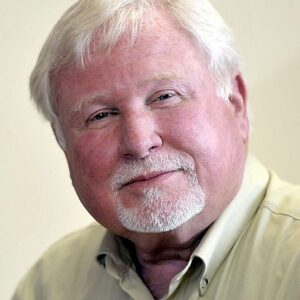Steve Graiver walked to the message board in front of his small business and carefully arranged the letters to spell out four heartfelt words: Thanks for the memories. The message had nothing to do with the pandemic and Graiver’s struggle to keep Steve’s Country Store and Classic Catering business open.
It had everything to do with the death of Bob Bahre.
That was July 24. Three months later, as the leaves of autumn continued dropping in the small western Maine community of Oxford, the words remain.
“I don’t know when I’ll change the sign,” said Graiver. “I don’t know if I ever will. We’ll never see another man like Bob.”
Bob Bahre died this summer at age 93. Media outlets highlighted the short, country track he owned that was Oxford Plains Speedway, and the mile-long oval he built in Loudon and named New Hampshire Motor Speedway. They noted he was a very successful developer, businessman, classic car collector and banker.
But Bahre was so much more.
He also donated millions of dollars over decades to help hard-working people pay their bills. Few outside the small towns of Oxford, Norway, South Paris, Paris Hill and West Paris knew the extent of his gifts.
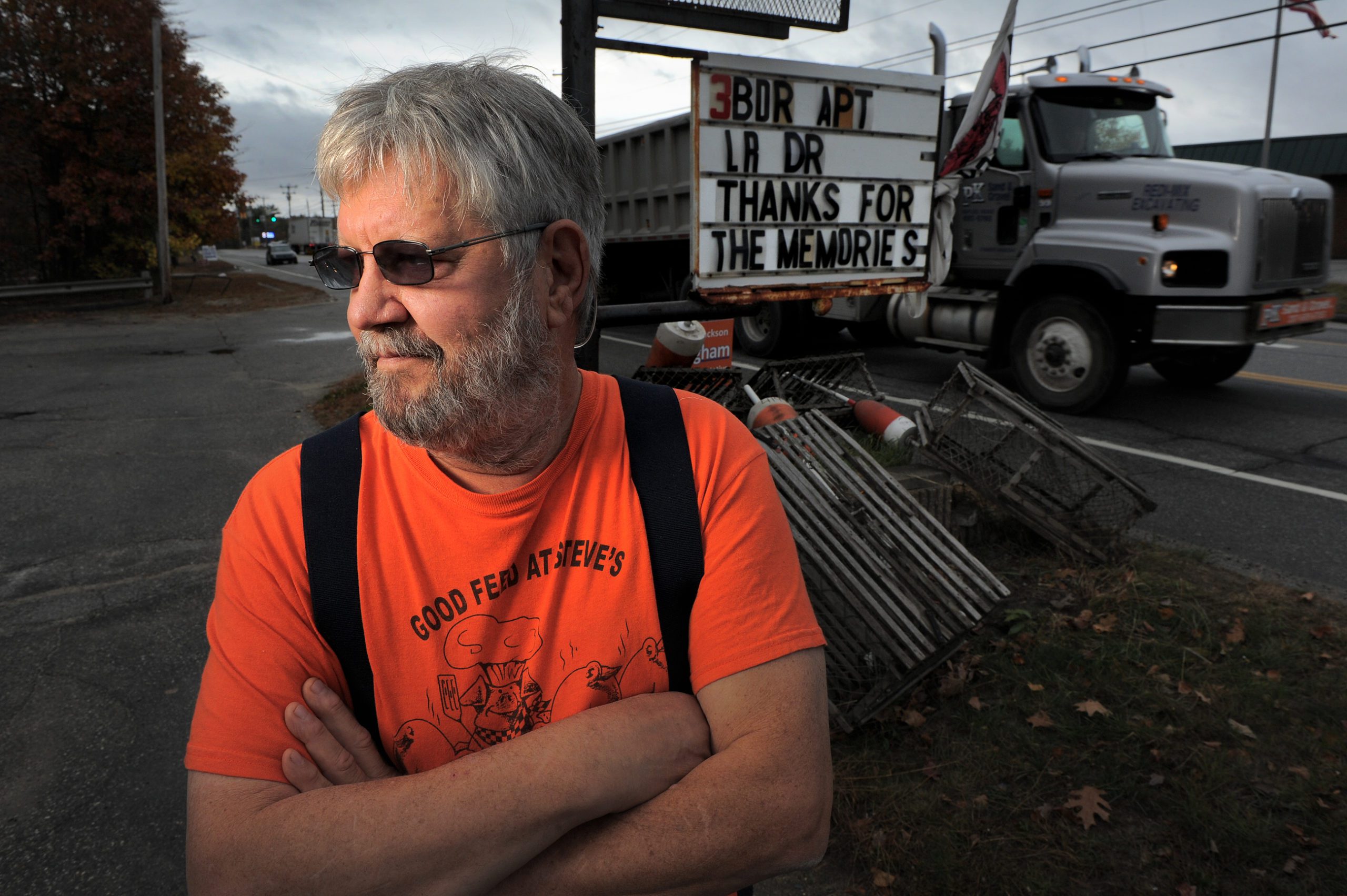
That’s why Graiver’s message was not the only one seen after Bahre died. No one counted but there were many visible signs, particularly along Route 26, which links the state’s Oxford Hills region. The sense of loss was palpable. The not-so-secret, Secret Santa was gone.
The messages were simple variations of a theme. Thank you Bob for sharing your wealth, experience and foresight. Thank you for the memories.
A post on Graiver’s business Facebook page amplified the feelings: “It’s hard to find the words to pay tribute to such an iconic man. His loss will leave a huge hole in our community and our hearts. Bob’s impact on a little greasy spoon was immeasurable. We will miss our afternoon conversations over iced tea and tapioca.
“He taught us a lot, he made us better and always watched out for us.”
Alan Wilson, a stock car driver from the nearby town of Hebron, echoed that sentiment in the Kennebec Journal. “It’s like the movie, ‘It’s a Wonderful Life,’ where one person affects so many lives,” said Wilson. “Bob Bahre has affected so many lives it’s just unbelievable, and some of these people don’t even know it.”
Bahre first came to Oxford in 1963 as the owner of a Midget race car entered in a race at the local speedway. He was a successful home builder in Connecticut at the time. He liked his interactions with local drivers and car owners and the fans. He bought the track.
Mike Helton, NASCAR’s vice chairman, spoke at Bahre’s funeral held in the infield of this little speedway, acknowledging his foresight. “Bob had great vision. He could see around corners.”
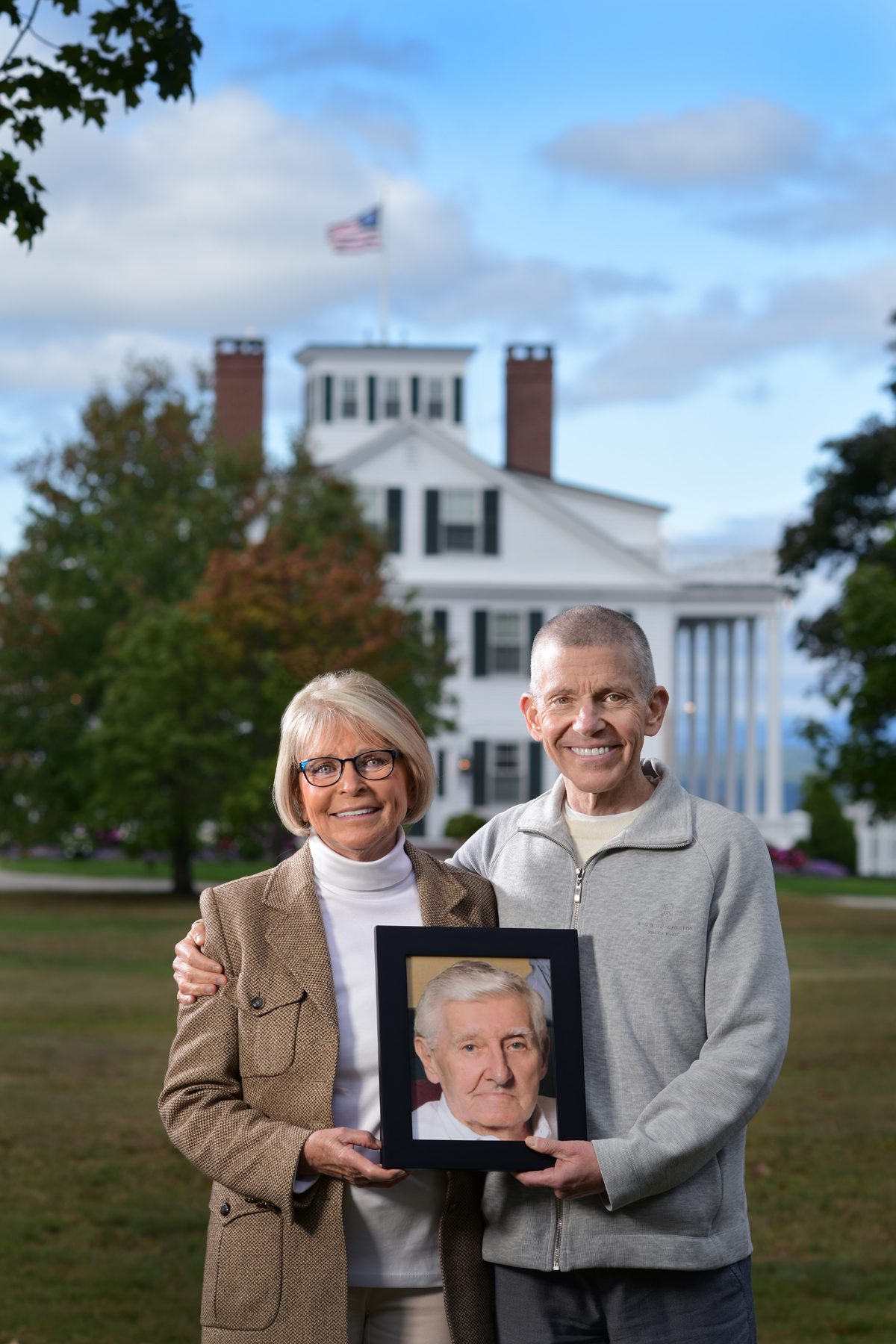
Bahre could see the development opportunities, not only with the speedway but with the vacant land from the Oxford town line up to Norway and South Paris.
For more than 20 years, Bahre was usually front and center, overseeing the racing from a circular slab of concrete across the front straight from the flag stand. Bahre’s wife, Sandy, was busy behind the scenes. Daughter Terri helped with the popcorn in the concession area. Her younger brother Gary was supposed to walk the aisles of the vast front grandstand, selling popcorn. Their grandfather took tickets at one of the gates.
Many times Gary would sit in the front row near the start/finish line with his grandmother, watching his father realign the race cars after a stoppage for an accident or debris on the track. In the relative quiet, Gary would hear his father bark at a driver who was in the wrong spot.
And then he would hear his grandmother say, ‘I wish Bobby wouldn’t yell at the drivers like that.’
“The nights spent there, sitting with my grandmother, hearing the crowd and all the noise are among my fondest memories,” said Gary Bahre.
Oxford Plains Speedway became the family’s anchor to the region. At first the family commuted from its home in Connecticut, living in a trailer on the speedway property during racing season. That trailer is still there, parallel to Route 26, said Gary Bahre. Soon they spent summers in a cottage on Thompson Lake in Otisfield.
They maintained their Connecticut home until the day Bahre asked his wife to drive to Paris Hill and look at houses for sale. Sandy Bahre had never been to Paris Hill, and her eyes widened as they reached the top of the hill. Across the public green she saw the Hannibal Hamlin home.
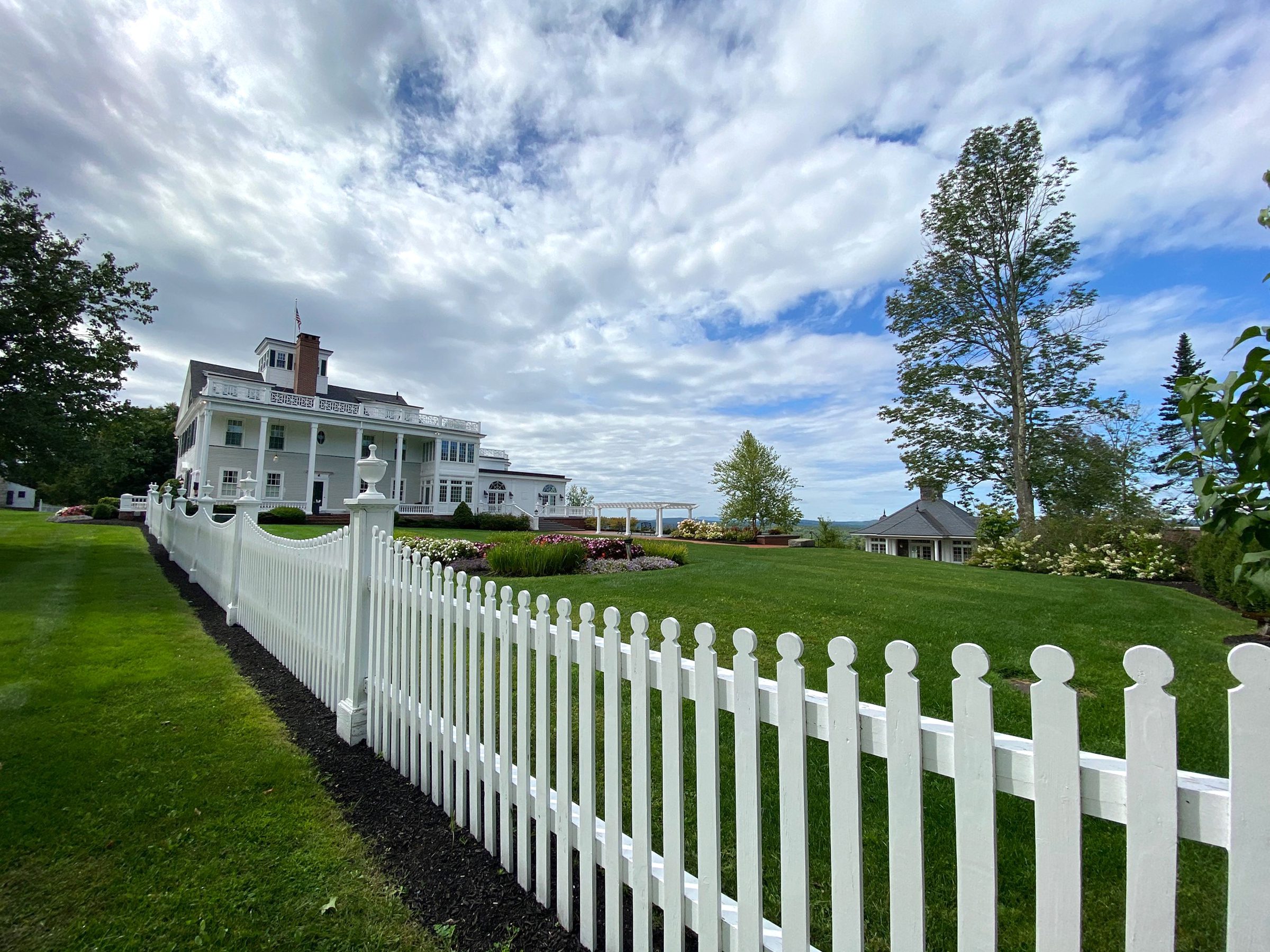
“You can buy me that house,” said Sandy Bahre. The property, with its expansive views of the White Mountains, was for sale but hadn’t yet been listed. Bahre’s intent all along was to show her that exact house. The home, built by the father of Hannibal Hamlin, Abraham Lincoln’s first vice president, became theirs. The Bahres bought the house in the early 1970s.
“I fell in love with the people here,” said Sandy Bahre. “Bob fell in love. These were honest, hard-working people.”
A few miles from Graiver’s business, Stephens Memorial Hospital in Norway opened its newest medical facility Oct. 19. The two-story Bob and Sandy Bahre Health Center will serve patients who need rehabilitation services or specialty care. It’s the first time Bob Bahre’s name has been attached to a building and made so visible.
“My father loved seeing a smile or getting a thank-you note,” said Gary Bahre, 57. Meaning, those two simple acts of gratitude were sufficient. It was not an easy decision for Gary and his mother, Sandy, to permit Bob’s name on the health center signage.
“We thought long and hard,” said Sandy Bahre. “Bob wouldn’t want it. We decided it was time his name was on something.”
Bob Bahre was neither shy nor reclusive. He preferred his definition of anonymity. “My father always said if he wanted to see his name in the newspaper, he’d rob a bank,” said Gary Bahre. An interesting thought considering Bob Bahre once owned the Oxford Savings and Trust, now a branch of TD Bank.
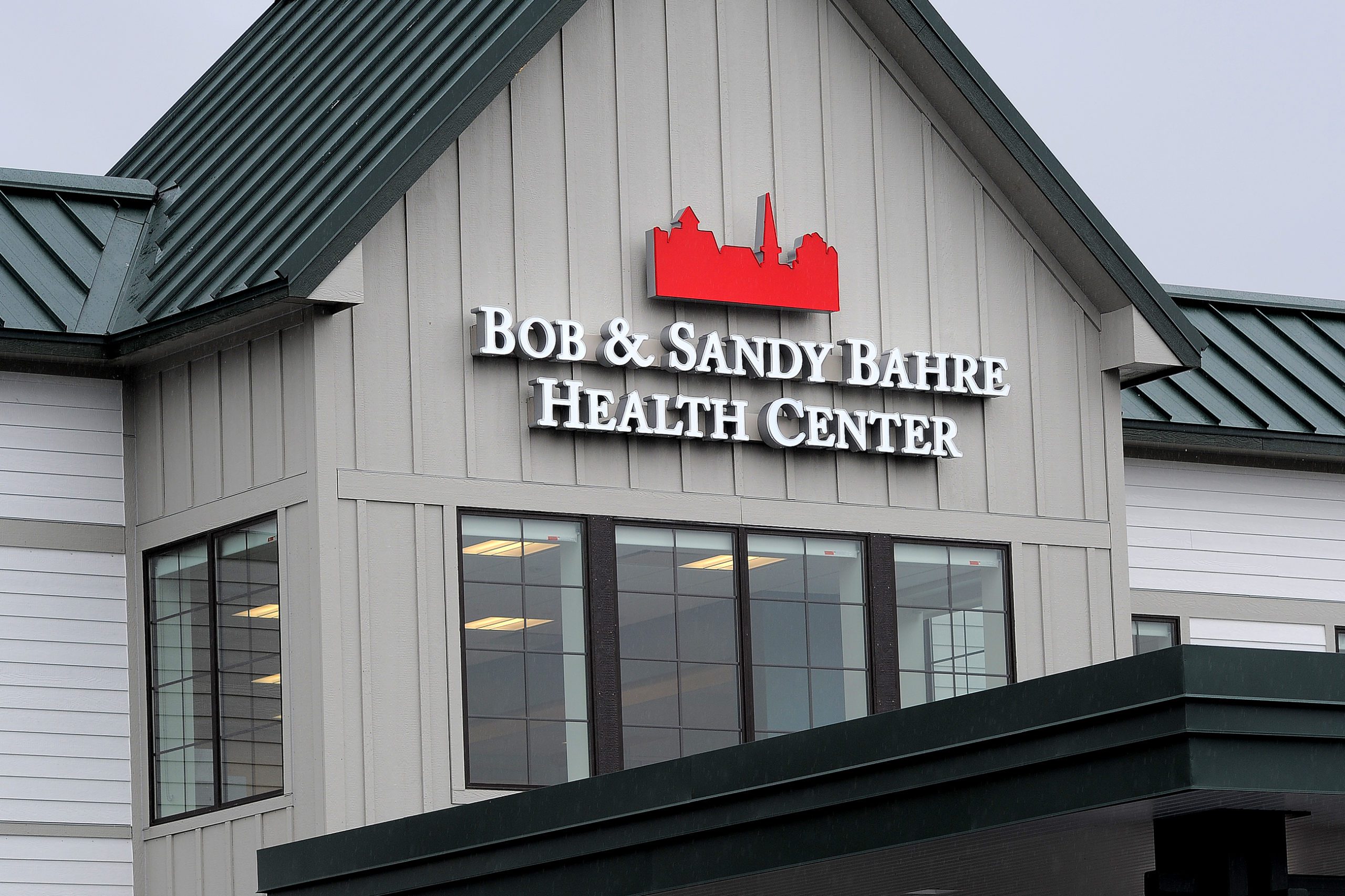
With his daily uniform of white shirt, light yellow cardigan, khaki pants and shock of white hair, Bahre could be very visible. He usually ran his own errands. Bahre and his wife ate at local restaurants. He didn’t hesitate to ask people for their opinions, where they lived, or what they earned.
“He and Sandy always really made a point of getting to know the people who waited on them,” said Nancy Cushman, now the president of Bahre’s Speedway, Inc., the nerve center for his business interests. Cushman once worked for the Portland-based company that did Bahre’s audits and tax work. One of her responsibilities was to give Bahre his spending money each week.
“He called me his money honey,” said Cushman. “We never squared up the cash. He always did feel the need to explain what he had done with it. Inevitably it involved helping a waitress with medical expenses, prom dresses, weddings, educational expenses, car payments, or anything else he might learn while eating out.
“It was never that anyone asked him for anything. He would want to make things a little easier for them simply because he could.”
RELATED: For Bob Bahre, collecting classic cars never got old
But Bahre played hardball in his business dealings, whether real estate transactions, working with contractors on development projects or buying a Christmas gift for the wife he adored. Gary Bahre won’t forget the weekend in New York when he and his sister visited Cartier’s, the exclusive jeweler, to scout a possible gift their dad could give their mother.
“We found a bracelet and went back to the hotel to tell Bob,” said Gary Bahre. “He went with us to Cartier’s. We were taken to a small room where a woman wearing white gloves showed my dad the bracelet.”
Bob Bahre thought the price was too high and said so. He started to dicker. His son and daughter were mortified. Bahre’s offer of 25 percent less was rejected, politely. On a piece of paper, Bahre wrote his name, the name of the Waldorf Astoria, where they were staying, and the room number. Call me, Bahre said, if you change your mind.
“We went back to the hotel,” said Gary Bahre. “I was still shaking my head. Dad, this is Cartier’s. You don’t dicker with Cartier’s.”
Bob Bahre knew better. A few hours later the phone rang. His offer of 25 percent off was accepted. Sandy Bahre got a beautiful bracelet for Christmas.
“My dad had a saying,” said Gary Bahre. “It’s not what you earn, it’s what you keep.”
Although that saying was forgotten easily when Bahre decided to press hundred-dollar bills into the hands of townspeople. No one knows how much money went into those hands.
“People still come up to us, thanking us for something Bob did for them,” said Sandy Bahre. “Gary and I look at each other. Most of the time we had no idea.”
Bob and Sandy Bahre also donated several million dollars on several occasions to the Oxford Hills Scholarship Foundation.
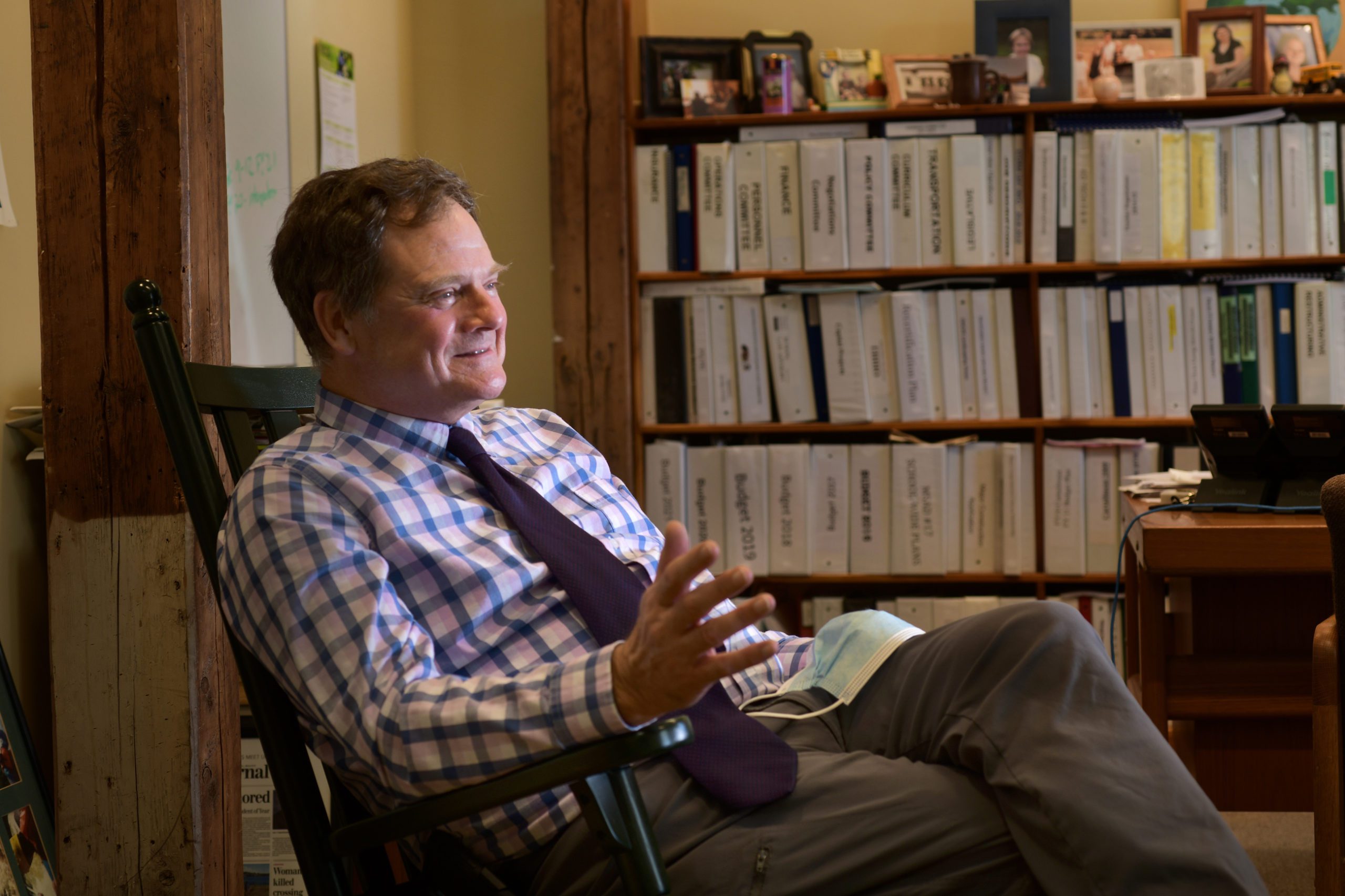
The foundation assets now total about $10 million, said Rick Colpitts, superintendent of Oxford Hills’ school district, MSAD 17. Colpitts believes it is the richest among Maine public high schools. Last year some $900,000 was dispersed to Oxford Hills High graduates.
Attempts have been made over the years to rename the foundation, adding Bahre’s name, although there are other donors. “Bob wouldn’t hear of it,” said Colpitts. “I understand, in the beginning, he was so careful of remaining anonymous, the check came from an out-of-state bank.”
That Bahre did not graduate from high school is not widely known. He didn’t hide the fact and took pride in his achievements without a formal higher education. He liked to say his best four years in school were spent in the seventh grade. It was a joke.
In 2012, Colpitts went to Ron Kugell, the school board chairman at the time, and suggested Bahre be awarded an Oxford Hills diploma based on his life experiences and accomplishments. Bahre was 85 at the time. The suggestion was approved, although Colpitts wondered how this self-made, successful man would react.
The presentation was made one morning in Bahre’s Speedway, Inc. offices on a side street off Route 26. Bahre accepted the diploma but saw something was missing. Where’s my tassel? Ted Moccia, the high school principal said he’d get one and left for the high school. Moccia returned just as Bahre was leaving in his car for lunch and pulled up, their two driver-side windows facing each other.
“Do you have my tassel?”
Moccia reached out his window and handed it to Bahre, who hung it on his rear-view mirror, saying now it was official. With a laugh the new graduate drove to lunch.
Bahre grew up with two brothers on a dairy farm in the Connecticut River valley in far north central Connecticut, not far from Springfield, Mass. He was a 4-H member as a boy. He milked cows by hand, picked tobacco leaves for 25 cents an hour and learned how to weld farm equipment. He met Sandy after asking her father for permission to put his cows in a pasture behind Sandy’s house. Sandy, then 15, had a horse at the time.
Many years later, Bahre would attend the Oxford County Fair, drawn to the 4-H competition, watching youngsters parade the steers they raised.
“Bob always bought the grand champion (at the auction that followed),” said Jackie Young, president of the Oxford Fair and livestock director. “He’d buy four or five steers. If no one was bidding on the ninth- or 11th-place steer, Bob made sure he bid.”
Sandy Bahre would make her own bids, sometimes getting so excited she bid against herself. Her husband was more discreet, turning to someone standing next to him and saying in a low voice, bid me up, bid me up.
There are men and women now in their 50s, said Young, who won’t forget the day Bahre put smiles on their faces and a lot of money in their pockets. Oxford Fair 4-H competitors may have gotten the best prices in Maine for their steers.
“The most important thing, Bob was there,” said Young. “He was so visible. The kids knew who he was and that meant a lot to them.”
But you never found Bahre’s name in the fair program. In his mind that would be self-promotion and he would have none of it.
The Oxford Fair is a small one relative to the Fryeburg Fair or the agricultural fairs in Skowhegan and Windsor. Oxford’s directors considered doing away with Dollar Day, when admission was a dollar and parking was a dollar. Midway rides were cheaper, too. Bahre wanted Dollar Day to continue and subsidized the financial losses.
He paid for the main music acts, such as the Marshall Tucker Band or the Charlie Daniels Band. He paid Steve Graiver to cater.
“When Bob helped like that, it had a ripple effect,” said Young. “Other people benefited. Early on the steers went to (the former Opportunity Farm for Boys in New Gloucester). Later on Bob would pay to have the steers processed and give the beef to his employees.
He helped the local women’s softball league with their field. He helped MSAD 17 find new space for classrooms when mold became a problem in one of the schools. And he paid for renovations and fresh paint.
Examples of his giving could go on and on.
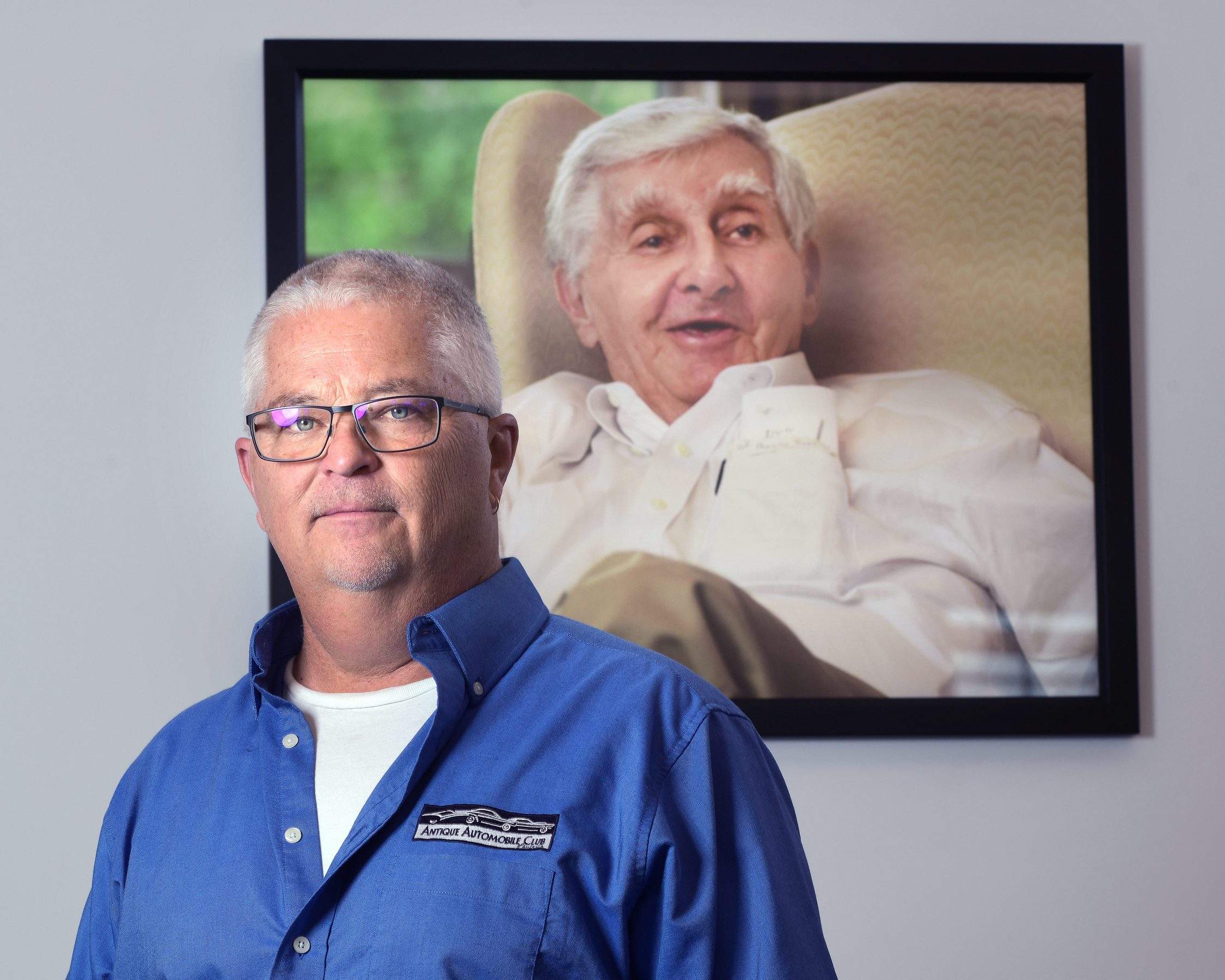
Jeff Orwig, the curator of Bahre’s collection of some 60 classic cars, was stopped constantly around the region to hear condolences after Bahre’s death. “People didn’t know me but knew I worked for Bob,” said Orwig. “They wanted to tell me how sorry they felt and why. If I talked with a hundred people, I’d hear a hundred different stories.”
Bahre was a quick judge of character. He had a temper, could be exceedingly blunt and his bark could be fearsome. Until attorneys told him otherwise, he liked to close deals with a handshake but was wary of anyone trying to take advantage of his wealth. Most of all, he held those around him accountable.
Carol Mitchell, an attorney working for People’s Heritage Bank when Bahre was on its board of directors, posted a memory on the tribute page of Bahre’s obituary. She wrote that Bahre was unique. She had many fond memories of working with him, including the day she was asked a question as the bank’s attorney. Bahre lost patience with her answer.
“I proceeded to drone on,” wrote Mitchell. “Bob interrupted after about two minutes and said, ‘Hey kid, do we pay you for that kind of answer, coz it’s kinda #!#’. I always appreciated his blunt advice, extreme kindness and friendship.”
Bahre had a sweet tooth. A sports writer once walked into his office at New Hampshire Motor Speedway for a pre-arranged interview. A hard hat with “Bob” written on it sat at one corner of his desk. A large bag of large marshmallows was at the other corner. Bahre’s hand was in the bag. He offered some marshmallows to the writer. “Here, they’re good.”
Marshmallows and hard hat. The symbolism was too great to ignore. Did he plan it?
The conversation that day was about the deaths of drivers Adam Petty and Kenny Irwin in violent spinning one-car crashes in practice within months of each other at New Hampshire Motor Speedway in 2000. The story dealt with his accountants telling Bahre he had a very good financial year at the speedway. It was his worst year, emotionally. Adam Petty was Richard Petty’s grandson. Both deaths shook Bahre but Petty’s was more personal.
“My father talked about that almost up until he died,” said Gary Bahre. “He didn’t know Kenny as well as Adam, but he got to know Kenny’s parents well.”
Politically, Bahre was a conservative who trusted his own judgment when supporting candidates. Ken Curtis, the popular Democrat who served as Maine’s governor from 1967-75, got Bahre’s support and friendship. Bahre liked Mike Michaud’s work ethic but in the end supported Paul LePage’s candidacy for governor in 2014. After building New Hampshire Motor Speedway, Bahre got to know and respect Jeanne Shaheen, a Democrat, former New Hampshire governor and current U.S. Senator.
The late John McCain, the Republican U.S. Senator and presidential candidate, stopped at NHMS to visit Bahre. With him was former New York mayor Rudy Giuliani. Bahre soon turned and walked away from Giuliani in mid-sentence. Gary Bahre ran after his father. “Dad, you can’t just walk away.”
“My father said he could. He said Giuliani was acting like a big shot and he didn’t have to listen to him anymore.”
Mike Chammings, the former Oxford town manager, saw Bahre as a problem solver, someone who could see and understand what others couldn’t. The two worked on many projects together but none more important than the Oxford Casino, which didn’t win approval from voters until Bahre added his support.
Bahre, who didn’t gamble or take extraordinary risks in business, saw the loss of jobs in Oxford County. He was more interested in lowering unemployment than putting more money in his own pocket when he backed the project.
Nancy Cushman remembers Bahre’s role in the naming of the casino. While different names were suggested and shot down, Bahre got to the point. “Everyone’s already calling it the Oxford Casino. Call it that.”
There was no further discussion, said Cushman. The casino had its name.
Chammings, like many others, has already missed his conversations with Bahre even if they seemed one-sided at first. “Whatever information was in your mind was soon in Bob’s mind,” said Chammings. “He knew how to get you to tell everything.”
Robert Deeley, the Catholic bishop of Portland, said much the same thing at Bahre’s funeral under sun-kissed skies at Oxford Plains Speedway. Deeley talked about his first meeting with Bahre, who attended Mass regularly at St. Catherine of Siena in Norway. “I thought I was being interviewed for a job I already had.”
At the end of their conversation or interrogation, Bahre smiled and told Bishop Deeley he liked him and they should have lunch sometime. The bishop, like so many others in Bahre’s life, had passed some sort of test.
Cushman had the unenviable responsibility of calling many of Bahre’s friends to let them know of his death. “I made a lot of men cry,” said Cushman.
“I still can’t believe he’s gone,” said Gary Bahre. “I thought he would live forever.”
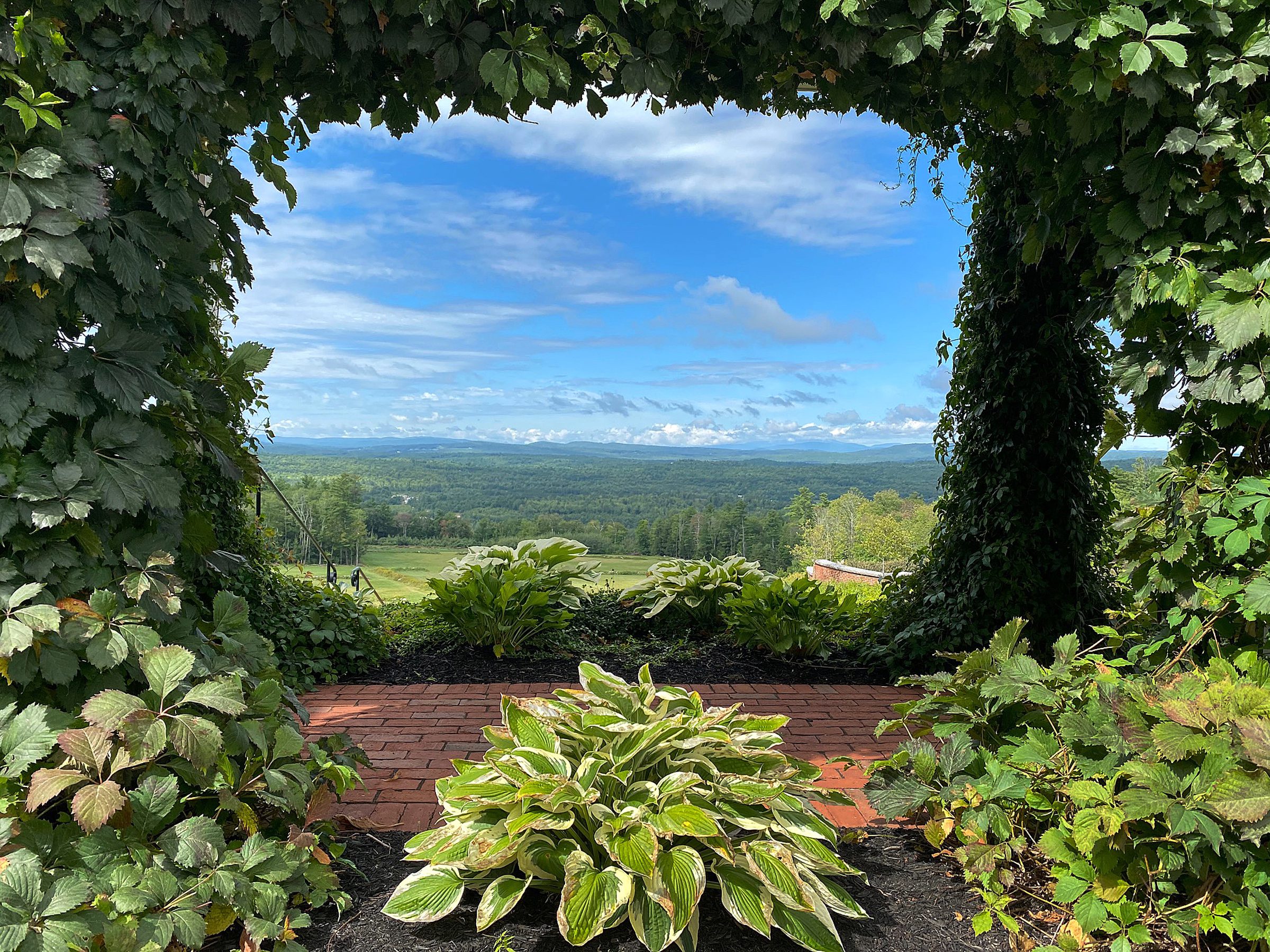
The pallbearers at Bahre’s funeral in late July mirrored the diversity of those closest to Bahre: Mike Helton, the vice chairman of NASCAR, former Cup drivers Ricky Craven and Morgan Shepherd. Mike Rowe, the multi-time track champion at Oxford Plains Speedway and multi-time winner of Bahre’s signature race, the Oxford 250. Ken Hoyt and Ken Grant, who worked for Bahre in Oxford for more than 30 years. Bruce Stone, who worked for Bahre at New Hampshire Motor Speedway. Chris Coggeshall, a longtime Portland-based attorney for Bahre.
They met for breakfast at Steve Graiver’s place, with white linen tablecloths set out on tables. It’s a modest eatery, where Bahre would come for breakfast and lunch most days, and an afternoon snack. On snow days, Bahre would drive to Steve’s for an early breakfast when it was full of municipal or private plow drivers. Before Bahre left, he’d signal to Graiver, his hand up in the air, finger extended and circling like a baseball umpire calling a home run.
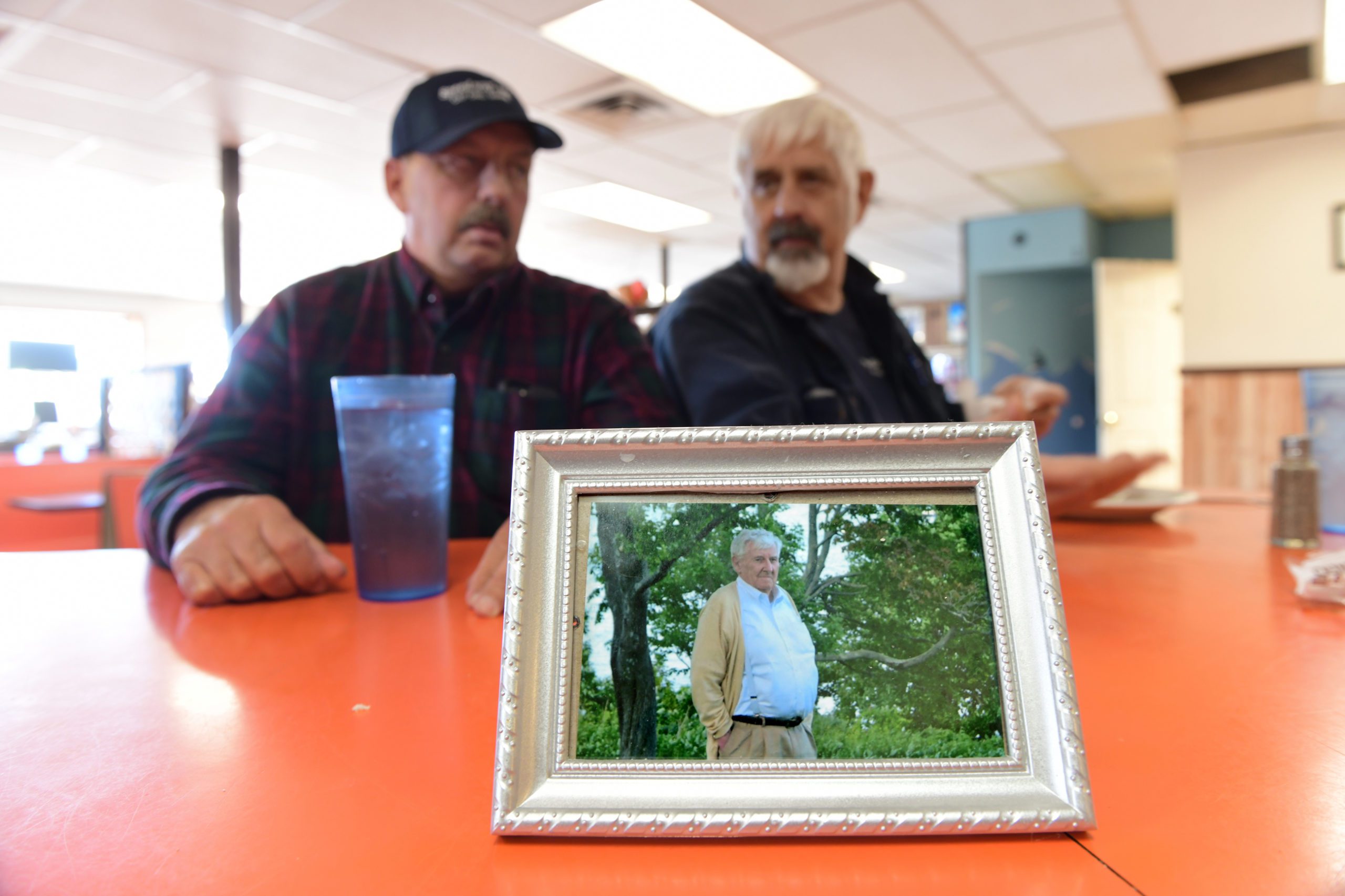
“Breakfast is on me. Everyone.” Then Bahre would step out the door and leave.
When plow drivers came to the cash register, they were told their bill was already paid. They could guess by whom.
Graiver, a former ironworker who helped build tall buildings in Massachusetts and New York, has owned his business for more than 30 years and knew Bahre for about as long. A different framed photo of Bahre sits on every table and hangs on a wall. Like the message out front, Graiver doesn’t know when the photos will be packed away, if ever.
These days, when Ken Hoyt, better known as Kackle, stops for breakfast and lunch and meets up with others, like Floyd Thayer, an Oxford selectman and owner of a truck repair business, the conversation or the good-natured but pointed ribbing can turn to Bahre. “Seeing Bob’s face, it’s like he’s still here,” said Graiver.
“He was a great man. He taught me so much. After about 25 years he finally told me I was doing a good job with the business. When he left, I cried.”




